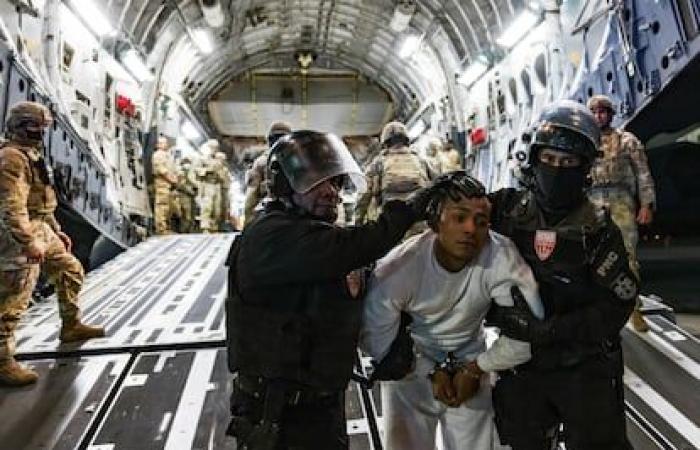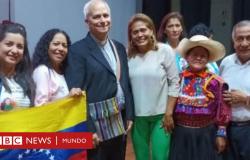
Kilmar Abrego García has become a symbol of arbitrariness and injustices that Donald Trump’s administration has committed in his mass deportation campaign. Rivers of ink have run over their expulsion to El Salvador, although it had a court order that prohibited it, and the government’s refusal to facilitate its return after the Supreme Court ordered it. But the Salvadoran was not the only migrant improperly deported that March night. Daniel Lozano-Camargo also had a judicial document that protected him from deportation and was still thickened and put on an plane to the Central American country to, when he arrived, being imprisoned in a maximum security prison for “terrorists”.
The case of Lozano-Camargo has received less media attention than Abrego García, but has reached the courts. A federal judge ordered at the end of April that the Trump administration facilitated its return when considering that the 20 -year -old Venezuelan had been deported in violation of a 2024 legal agreement, which prohibited immigration authorities from expelling him from the country while his asylum application was pending. The government, however, has refused to bring it back.
Maryland Stephanie Gallagher’s district judge, appointed by Trump during her first term, approved in November last year a legally binding agreement under which the United States promised not to deport a group of migrants who entered the country as unaccompanied minors until their asylum requests were resolved. Lozano-Camargo was protected by that resolution, achieved by the government of Joe Biden in a 2019 collective claim, which challenged a change in asylum policy during Trump’s first presidency.
The identity of Lozano-Camargo had been hidden by the Court, under the pseudonym “Cristian”, until Politico He revealed his name in an exclusive published last Monday. The Venezuelan arrived only in the United States with 17 years and requested asylum in December 2022. His request was still pending when he was deported to El Salvador on March 15. The young man, along with another 237 Venezuelans and 23 Salvadorans, including Abrego García, was expelled from the country without due process by virtue of a law of 1798 provided for war times, that of foreign enemies, which allows the accelerated expulsion of foreigners considered a threat.
The deportees were accused of belonging to Latin American gangs that the Trump government has designated as terrorist organizations-the Venezuelan the Train of Aragua and the MS-13 Salvadoran-and transferred to the CECOT, a megacárcel denounced for its bad conditions and the violation of human rights of the inmates. This despite the fact that the vast majority of them lacked criminal records, as several journalistic investigations have demonstrated and as the government itself has recognized. Their families and lawyers continue to defend their innocence and claim their return, and ensure that many of the migrants were arrested and deported simply by their nationality or for their tattoos, without sufficient evidence to demonstrate any link with the bands.
To justify the deportation of Lozano-Camargo, the Department of Justice initially reasoned that the invocation of the Law of Foreign Enemies replaced the 2024 agreement that protected it from the expulsion while processed its asylum request. However, after Judge Gallagher rejected that argument and ordered that her return be facilitated so that she could access the process “to which he was entitled”, the administration changed tactics.
At an audience this Tuesday, he argued that although the Venezuelan was returned to the United States and his asylum application continued, he would allegedly be part of a “violent terrorist band.” Therefore, the government insisted, its return was unnecessary, since it would not “serve any legal or practical purpose.”
Once again, Gallagher disagreed. “I don’t think this is a case about whether Cristian will get asylum or not. If he finally receives asylum is not the issue. The question is, and it has always been, the process,” the magistrate said. “We do not get ahead of the end and we say, ‘we all know how this will end.’ My order demands that Cristian be returned to this country to access the process,” he said.
-Although Gallagher paused his decision for 48 hours for the government to appeal, he said that if he does not or if a superior court does not order him to stop, he will demand that the administration begin to inform him about the steps he is taking to bring back to Lozano-Camargo, just as he has made the judge in charge of Abrego García’s case.
Who is Daniel Lozano-Camargo, or “Cristian”
His name has always figured in the list of deportees made public at the end of March. And his history and photos have appeared in several reports about expulsions to El Salvador. However, it was not known publicly until this week that, like Abrego García, the young man was improperly deported.
Politico On Monday reported that Lozano-Camargo was really “Cristian”, the Venezuelan migrant whose return Judge Gallagher had ordered at the end of last month. Although his identity had remained hidden in judicial procedures since April, the medium was able to identify it through metadata embedded in the judicial archives of the case. The magistrate had approved the use of alias to protect man by considering that he and other migrants in similar situations “clearly face the risk of reprisals in their country of origin, as well as in detention in El Salvador and potentially within the United States, if their identities are made public.”
After his name was published, it has been possible to rebuild his story of how he arrived in the United States with 17 years and how he ended up imprisoned in El Salvador with 20, based on statements that his family has made to the press and details included in judicial documents.
Although he is originally from Maracaibo, Venezuela, Lozano-Camargo emigrated to the United States from Colombia, where he lived a few years with an uncle. After crossing the southern border of the country irregularly in 2022, he was arrested by the immigration authorities and sent to a center for minors, where he remained until he turned 18. From that moment he settled in Houston, Texas. He submitted an asylum application and got a work permit. He launched a car wash business, which promoted through Facebook, and formed a family with his partner and her baby, whom he considered as his own daughter.
However, his immigration situation was complicated last year, after being arrested twice for cocaine possession. He was first arrested in June and accused of loading between one and four grams of cocaine. He was released on personal bond, but this was revoked after not appearing to a judicial appointment in October. In November he was arrested again, this time for having less than one gram.
In January of this year, the Venezuelan declared himself guilty of a minor drug crime as part of an agreement with the Prosecutor’s Office and was sentenced to 120 days in jail. From there, however, he was delivered to the immigration authorities to be deported, although he had a valid work permit and a pending asylum application, so he should not have been expelled.
The rest is history. Lozano-Camargo will meet next week two months imprisoned in El Salvador. His mother, grandmother and couple insist, on all possible ways, that the young man has nothing to do with any gang. That his tattoos – a pink, hands in prayer, a crown, the names of his father and the daughter of his girlfriend, among others – were used as justification to deport him.





